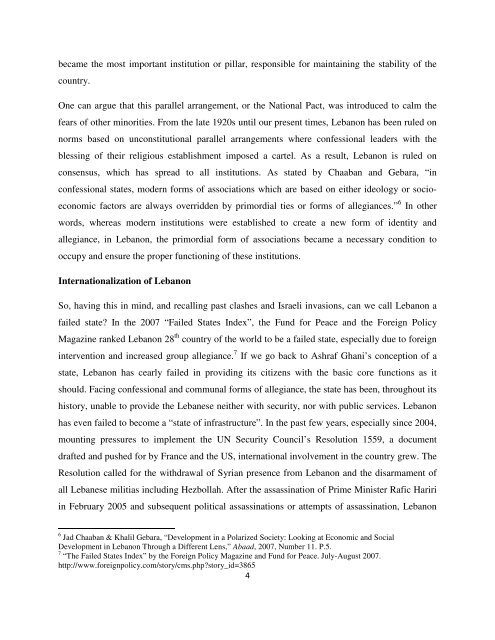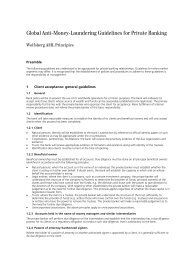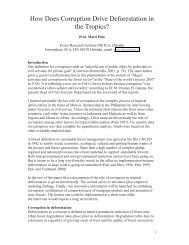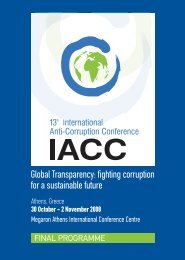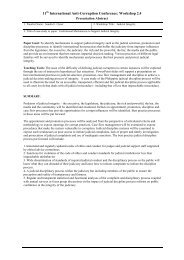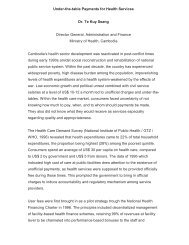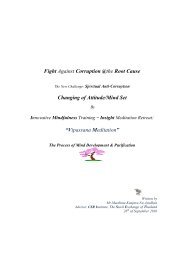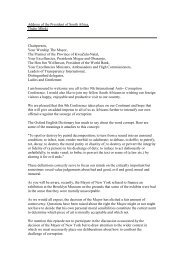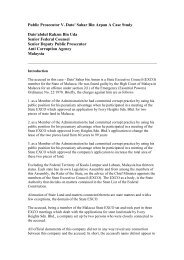The Role of Non-State Actors in Lebanon - International Anti ...
The Role of Non-State Actors in Lebanon - International Anti ...
The Role of Non-State Actors in Lebanon - International Anti ...
Create successful ePaper yourself
Turn your PDF publications into a flip-book with our unique Google optimized e-Paper software.
ecame the most important <strong>in</strong>stitution or pillar, responsible for ma<strong>in</strong>ta<strong>in</strong><strong>in</strong>g the stability <strong>of</strong> thecountry.One can argue that this parallel arrangement, or the National Pact, was <strong>in</strong>troduced to calm thefears <strong>of</strong> other m<strong>in</strong>orities. From the late 1920s until our present times, <strong>Lebanon</strong> has been ruled onnorms based on unconstitutional parallel arrangements where confessional leaders with thebless<strong>in</strong>g <strong>of</strong> their religious establishment imposed a cartel. As a result, <strong>Lebanon</strong> is ruled onconsensus, which has spread to all <strong>in</strong>stitutions. As stated by Chaaban and Gebara, “<strong>in</strong>confessional states, modern forms <strong>of</strong> associations which are based on either ideology or socioeconomicfactors are always overridden by primordial ties or forms <strong>of</strong> allegiances.” 6 In otherwords, whereas modern <strong>in</strong>stitutions were established to create a new form <strong>of</strong> identity andallegiance, <strong>in</strong> <strong>Lebanon</strong>, the primordial form <strong>of</strong> associations became a necessary condition tooccupy and ensure the proper function<strong>in</strong>g <strong>of</strong> these <strong>in</strong>stitutions.<strong>International</strong>ization <strong>of</strong> <strong>Lebanon</strong>So, hav<strong>in</strong>g this <strong>in</strong> m<strong>in</strong>d, and recall<strong>in</strong>g past clashes and Israeli <strong>in</strong>vasions, can we call <strong>Lebanon</strong> afailed state? In the 2007 “Failed <strong>State</strong>s Index”, the Fund for Peace and the Foreign PolicyMagaz<strong>in</strong>e ranked <strong>Lebanon</strong> 28 th country <strong>of</strong> the world to be a failed state, especially due to foreign<strong>in</strong>tervention and <strong>in</strong>creased group allegiance. 7 If we go back to Ashraf Ghani’s conception <strong>of</strong> astate, <strong>Lebanon</strong> has cearly failed <strong>in</strong> provid<strong>in</strong>g its citizens with the basic core functions as itshould. Fac<strong>in</strong>g confessional and communal forms <strong>of</strong> allegiance, the state has been, throughout itshistory, unable to provide the Lebanese neither with security, nor with public services. <strong>Lebanon</strong>has even failed to become a “state <strong>of</strong> <strong>in</strong>frastructure”. In the past few years, especially s<strong>in</strong>ce 2004,mount<strong>in</strong>g pressures to implement the UN Security Council’s Resolution 1559, a documentdrafted and pushed for by France and the US, <strong>in</strong>ternational <strong>in</strong>volvement <strong>in</strong> the country grew. <strong>The</strong>Resolution called for the withdrawal <strong>of</strong> Syrian presence from <strong>Lebanon</strong> and the disarmament <strong>of</strong>all Lebanese militias <strong>in</strong>clud<strong>in</strong>g Hezbollah. After the assass<strong>in</strong>ation <strong>of</strong> Prime M<strong>in</strong>ister Rafic Hariri<strong>in</strong> February 2005 and subsequent political assass<strong>in</strong>ations or attempts <strong>of</strong> assass<strong>in</strong>ation, <strong>Lebanon</strong>6 Jad Chaaban & Khalil Gebara, “Development <strong>in</strong> a Polarized Society: Look<strong>in</strong>g at Economic and SocialDevelopment <strong>in</strong> <strong>Lebanon</strong> Through a Different Lens,” Abaad, 2007, Number 11. P.5.7 “<strong>The</strong> Failed <strong>State</strong>s Index” by the Foreign Policy Magaz<strong>in</strong>e and Fund for Peace. July-August 2007.http://www.foreignpolicy.com/story/cms.php?story_id=38654


